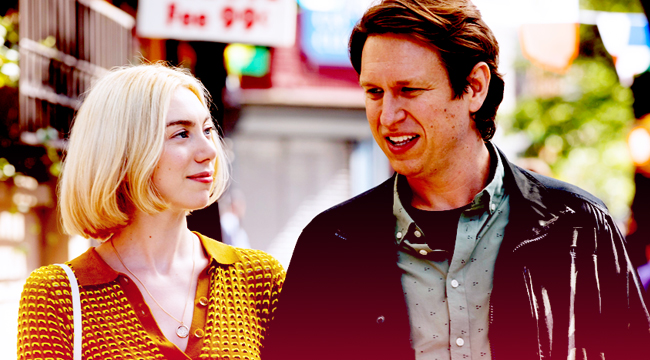
So many modern romantic comedies get it wrong, trading truth for meet-cutes and cliches. The most compelling love stories are the ones where the characters don’t quite belong together and sometimes don’t even wind up together. The timing isn’t right or maybe they’re just as wrong in some aspects as they are right in others. You can’t look away from the excitement, heat, laughter, drama, awkwardness, and tears. Because a wreck is a fascinating thing to watch but also because it takes you back to the romanticized near misses that live in your own memory bank.
The relationship between Pete (Pete Holmes) and Kat (Madeline Wise) is a fine example of that kind of on-screen relationship, transforming Crashing into a sometimes frustrating (for these characters) love story that is layered on top of a lived-in comedy about a once-sheltered comedian expanding the definition of what he allows himself to believe in. Uproxx spoke with Holmes and Wise about that transformation, all the ways Pete is wrong for Kat, and whether they have a future together in this interview.
Some of the Pete character’s flaws were laid out there at the end of season two with Ali when she and Pete broke up. I’m curious if those flaws are going to be addressed in season three.
Pete Holmes: I think that certainly, yeah. I would say so. I think the third season revolves heavily around a new relationship, with someone… you know, it’s based loosely on my own life. I was married to, you know, someone who was just like me, then I dated a comedian who was just like me, and then you have your first relationship with someone who’s neither of those things. She’s not like you, she’s not a comedian, she’s very free-thinking, she’s a little bit wild. She’s sex-positive, which is something that is new for Pete, who grew up sort of puritanical. So he sort of dates, for lack of a better word, a wilder person, and it’s one of the phenomenons of when you’re dating someone, and you’re kind of pretending to be that kind of person, you know? You’re like, “Oh, I like this person, I think I could represent like I’m the sort of person she would want to date, and just see how long I could do that.” That’s sort of what’s going on in the third season. Although, Ali remains Pete’s friend, and I think there’s some interesting tension to play with there. Because even while Pete is kind of having his fun, and doing something exciting that he never thought he’d do, he’s still pulled in these directions, back towards the simpler life of being with a comedian, and the simpler life of being someone with more concrete values. Because there is a comfort in knowing what you believe, and what you don’t believe, and what you’ll do, and what you won’t do. And when you start to get away from that, it starts to get a little cold and a little bit scary sometimes.
I think Pete needs a lot of therapy. But, unfortunately, instead of therapy, he gets a moderately successful college tour. The main difference, I would say, between [season] one and two and three is that he has a little bit of success and a little bit of an ego, and from that ego, he’s going to make different mistakes, which is often what happens. Ultimately, I think it’s a little too much too fast, and he should’ve done some inner work before tackling something in the real world as exciting and dynamic as Madeline Wise. Madeline?
A very professional segue.
Madeline Wise: Incredible.
Madeline, what was your experience with the show before being cast, and what was the appeal of this new character?
Madeline: I admittedly had not watched the show. Before I auditioned, I watched a couple of episodes, but I hadn’t seen it before. I’m guilty of not being great at watching a ton of TV, but the appeal with the character… I recognize myself, and I recognize a lot of women that I know in her in that she is someone who’s… I think she’s actually doing a pretty good job of communicating what she is expecting from Pete and what she wants and what she needs and expects to get the same back. There was a part of me that just, when I first was reading the script, I recognized that she could be interpreted as the crazy girlfriend, but I knew the truth, which is that she is not crazy. It is that Pete makes her behave in cuckoo ways, and so, I saw that, and I just identified with her. Then, also, and this was lovely, and I can sort of tumble into the credit of Pete and the writers is that a lot of what Cat became as a character was… she came a little closer to who I am as a person. They were interested in making her more similar to me rather than this idea of how she was written initially. I identified with her. I liked her. I still like her.
Pete: Well, [a] brutally honest person and a very real person, which… she’s going to be driven crazy by someone [who is] repressed but seemingly normal.
Madeline: Yeah. He has the outward appearance of being a kind, squared away, normal guy who’s not going to fuck her over like guys have done in the past. Which would make it all the more pernicious when he turns out to be just as disappointing as every other guy.
Pete: Oh. My. God! (But it’s true.) [Laughs]

What was the appeal of telling a story that was, at times, more conventionally centered around the [start of a] relationship and away from Pete’s career path?
Pete: I think it was interesting for us to have comedy and career be a story we told in a small way. Meaning, could Pete, now that he’s back in New York and a little bit funnier, become a mainstay of just the club? What is it like to just try and become a regular at the club? Which, honestly, is a big deal for a comedian in New York, but we knew that it wouldn’t seem like a huge deal for the audience, and we didn’t want it to. We wanted the relationship and Pete’s inner transformation to be the headline. So, I think we just looked at previous seasons and what people responded to and what really seemed to work for us, as well, and it was always relational stuff. It was always stuff with the parents or Pete and Ali having their fight about art versus commerce. Then, we were like, “Well, how could we find somebody who pushes different buttons in Pete’s relationship?” And we thought that somebody that was sex-positive and honest and a little bit new age-y… We don’t talk about it too much, but you’re a little new age-y.
Madeline: Yeah, she’s a little woo-woo.
Pete: She’s a little woo… You want the audience to understand what’s going on career-wise so they don’t wonder. I think that’s always in the back of your mind, like, “Why isn’t Homer ever at work on The Simpsons?” Once we understand, like good Americans, how Pete is working, we’re freed up to get into the more interesting nitty-gritty of personal relationships, which I think is a little bit more dynamic, potentially, and a little bit more relatable. Even though I feel like comedy has been [a] representation of any sort of dream just because the whole point of it is to figure out who you are and have that be accepted.
In season three, especially, comedy really stands in the way of you having a normal relationship. It’s kind of this other party, really, that you are consumed by as opposed to being involved in that relationship full bore. Is that something that rang true in your real life at the time, or is that more of a convention for the show?
Pete: Yeah, I think it is true. Currently, with my wife now, Valerie, we talk about comedy like it’s a mistress or something. It’s a strange mistress that I have that does take a lot of my time and does take an effort to balance your emotional checkbook a little bit, but way, way, way less than when I was starting. When I was first married, I remember thinking if I had done SNL or something, it would’ve been bad news, because it would’ve meant that it probably would’ve broken up our relationship, and then that’s sort of the world that Pete is in. Where, at the beginning, comedy is so demanding of your time and your mental energy. And I do think it’s very, very hard to maintain a normal life outside of it. Now that I’m almost 40 and I’ve been doing comedy for 20 years and have a little bit of an audience and everything, it’s so different, but my sympathies go to all the people out there, all the comedians and the aspiring comedians that are sacrificing their friendships and their personal relationships. You have to work New Year’s. My poor first wife, she’s kissing nobody on New Year’s while I welcomed in the New Year in Cleveland with Jim Gaffigan. Like, what are you doing? You know? It’s a tricky business until it’s not. It’s a little bit like skateboarding. I only ever see people falling off their skateboards or Tony Hawk. I don’t see these in-betweens. There don’t seem to be any amateur skateboarders. Either they’re really good or really bad. It’s similar to comedy. You either have some balance, or you have none whatsoever.
There’s a line about Pete’s character and your character 10 years down the road. Knowing the Pete that you know now… [who the character is based on] Is this version of Pete someone that would be worthy of a relationship with Kat?
Madeline: I feel like I was saying this in an earlier interview… I think if Kat and Pete met up again in seven years, they would maybe be able to have a relationship. If you put aside the fact that I think she would probably not be interested in it, because I think he needed to evolve. I mean she wouldn’t be interested in it because he fucking hurt her, and that is a difficult thing to get over.
Pete: I think it’s another way of asking… is it Pete’s limitations that keep it from not working? I think that’s probably the truth.
Madeline: Yeah, I think so. And it’s like what’s frustrating is that he has to do some necessary evolution, and she helps get the ball rolling on that, and what’s annoying is that it’s like she can’t … or she should not stick around for that evolution and for him to make those changes in himself.
Is that evolution tied mostly to faith? Because I feel like this season is really important for your faith in terms of where you are at the start of the show to where, I think, you’ve been demonstrated as being in your comedy, just in real life. Is that fair to say?
Pete: Yeah, I think so. And I think she challenges Pete’s faith in a way, because she sort of represents when she talks to Pete’s mom about spirituality, she’s certainly quoting something that I believe now, which I was so far from believing then. Yeah, ultimately, like all big things on the show, it comes down to some sort of core ideology that Pete is trying to negotiate with or change.
Season three of ‘Crashing’ premieres Sunday at 10 pm EST on HBO.






